North Carolina Revolutionary War Heroine
Image: Martha Bell Monument
In 1928, Bell was honored with a granite monument at Guilford Courthouse National Military Park which reads:
Loyal Whig, Enthusiastic Patriot, Revolutionary Heroine.
Martha McFarland was born in 1735 in Alamance County, North Carolina. In 1759, Martha married Colonel John McGee, a prosperous farmer and trader who came to North Carolina in 1750. They had five children: Jane (1760-1835), Susannah (1761-1843), John (1763-1836), William (1768-1817) and Andrew McGee (d. 1819). The McGees were among the wealthiest people in the county.
John McGee died in 1773, but left his family well provided for. Martha carried on his business and farming, just as he had been doing. His farming operations were quite extensive for a new settler, and in the store, he bartered a great deal, by exchanging goods for deer skins, furs, flaxseed, beeswax and such items.
When he wanted a supply of goods he took his produce to Petersburg in wagons; and with a little money in addition, he obtained his supplies. After loading his own wagons, he rode along with them on horseback, keeping with the wagons through the day, and lodging in some house at night.
Having learned from him the route and the names of all his lodging places on the road, Martha set off on her first trading expedition and found no difficulty either on her way or in making her purchases. But after leaving Petersburg, it began snowing early in the day, and and she decided to leave the wagons and get out of the snow as soon as possible.
For a whole day’s journey, there was not a house of any description, and the only growth of timber was pine. The snow was whirling about in every direction, driving in her face and blinding her until she became completely lost. But having learned that the largest limbs of the pine tree grow on the south side, she used that as her guide, and arrived at her destination, where she rested for the night.
On May 6, 1779, Martha McGee married William Bell, who was also quite wealthy, and moved to his home on Deep River, in Randolph County, North Carolina, where he operated a mill and store. Bell was the first sheriff of Randolph County. There were no children from this marriage.
Martha was characterized as a “woman of strong mind, ardent temperament, and remarkably firm resolution.” Martha was also a midwife, and often traveled about the countryside to attend the births of children and to care the sick. She was a devoted Presbyterian and an ardent Patriot during the Revolutionary War.
The War in Randolph County
The area where the Bells lived was divided between Patriots and Tories (American colonists loyal to the British), and there was a great deal of violence on and off the battlefield. William Bell, a well-known business and political figure, had taken so active a part against the Tories, that he knew if he fell into their hands they would take his life.
For this reason, Bell spent a good deal of time away from home during the war – not as a soldier but under the protection of local militia. Martha was determined, at all risks, to prevent their property from being plundered, and took up the responsibility of caring for their home and family and operating the gristmill.
After the Battle of Guilford Courthouse, British General Lord Charles Cornwallis went to Bell’s Mill to confiscate corn and meal to feed his hungry army. (A historian found ruins of Bell’s Mill a few years ago, but the site is now covered by a lake.) While there he briefly occupied Martha Bell’s home as his headquarters.
According to her biographer, Eli Carruthers, Martha confronted the general, saying, “Sir, you possess the power, and, of course, will do as you please without my consent; but, after using our mill, do you intend to burn it before you leave?”
His lordship then assured her that the mill would not be harmed, and added that “by making her house his headquarters, he would be a protection to herself, her house, and every thing that was in or about it; for, said he, ‘no soldier of mine will dare to plunder, or commit depredations near my quarters.'”
To which she replied: ‘Had your lordship said that you intended to burn our mill, I had intended to save you the trouble by burning it myself before you derived much benefit from it; but as you assure me that the mill shall not be burned, and that you will be a protection to me, and to the property about the house, I will make no further objections to your using our mill, and making my house your headquarters.'”
Having been warned of their coming, Martha had hidden her most precious possessions before they arrived. It had been a common expedient with the people in the area to hide their treasure under rocks or to bury it in the ground, and the British had not only learned this fact from the Tories.
Martha took her supply of bacon over the river and hid it among some rocks where nobody would ever think of looking. Her money, all in specie (coins), much more valuable than the worthless Continental Dollar, and by far of more value than anything else the soldiers might take. This she had hid under a large rock which formed the bottom step to the door. The rock was so large that she could only pry up one side of it by herself.
Martha did not expect the army to be so near to the house, and to her great chagrin soldiers were all the time passing over the rock. She feared that the rock might be moved and all her cash, several years’ earnings, would not only be lost to her, but would go to feed and clothe her mortal enemies. She decided that it should not be lost without an effort to place it out of danger.
For this purpose, she went deliberately into the yard, under the pretext of making some request of the soldiers. Then she walked about carelessly, looking at the tents, until the soldiers’ attention was turned to something else. Casually she raised the side of the rock, took out her money and returned to the house, without attracting their attention.
In the evening of the day the British left her home, Martha made a visit to their camp to reconnoiter – to scout with the aim of gaining information – but under some other pretext. She might have been induced to go to there by Colonel Henry Lee III, better known as Light Horse Harry Lee.
Lee and Colonel William Washington were now hanging on the rear of the British, harassing their foraging parties and cutting off stragglers. General Nathanael Greene was preparing to pursue the retreating foe, and it was important for him to obtain information regarding their condition and movements.
The British army, crippled as it was, pressed with the difficulty of getting provisions, and encumbered with a large number of wounded officers and soldiers, moved very slowly. Cornwallis had left his men who were too badly wounded to travel at New Garden, trusting in the humanity of the Quakers there for their care.
But Cornwallis still had a great many wounded with him who could not bear long or rapid journeys, and they were dying all along the road. After leaving Bell’s Mill, they went only a few miles to the plantation of Mr. Walker and camped there for the night.
Colonel Lee was at Bell’s the day the British left, and he was well aware that Martha was familiar with every road and path, every plantation and hill in the area. Her patriotism and fearlessness made her an ideal candidate to scout the enemy camp. She would be in no danger, because Cornwallis had been so recently sheltered under her roof, he felt obliged to treat her with courtesy and respect. And she never left home without being armed with a dirk (dagger) and a pistol.
Martha’s objective was to ascertain the condition of the British army, especially whether they were receiving any reinforcements of Tories. Complaining that the soldiers had damaged her property, which she had not learned about until after they had left, she went into the camp and spoke to Cornwallis. While she was there, Martha managed to get the information she wanted and returned home safely, very pleased with what she had done.
The Tories were still making it dangerous for William Bell to be at home. During the autumn of 1781, he came for a short visit with his family. The Tories were soon aware of his return, and went there that night to take his life. The doors were all locked, so they decided to set the house on fire. If Bell attempted to run, they intended to shoot him and perhaps his step-sons.
As the intruders were passing around the house, Mr. Bell leaned out the window to shoot at them, but one of them struck him on the head with his sword and inflicted a severe wound. Martha called to her sons, boys in their teens who were upstairs in bed, to get ready to fire out the windows.
She then called to their servant boy Peter, loud enough for the men outside to hear, and told him to run tell John Clarke, who lived on the neighboring plantation, to bring his men right away. Though the men outside were ready to set the house ablaze, they dropped everything and ran.
Realizing that it was as unsafe as ever to remain in his own house, especially at night, Mr. Bell did not come home again for months. Martha still remained at home; but usually got eight or ten young men, on whose bravery she could depend, to stay in the house at night; it was usually during the night that the Tories committed their acts of terror.
Martha lived nearly forty more years after the Revolution. There is no record telling exactly when Mr. Bell died, but Martha was a widow, for the second time, for many years.
Martha McFarland McGee Bell died peacefully September 9, 1820, at her home in Randolph County, North Carolina, at the age of eighty-five. She was buried at the Bell-Welborn Cemetery.
SOURCES
Family History Bites
Blogging the Revolution
Martha McFarlane McGee Bell
Bell’s Mill National Historic Treasure
Women Honored at Guilford Courthouse
A special thanks to Gary Strader and his wonderful website about Martha Bell and Bell’s Mill: Bell’s Mill National Historic Treasure (link above).
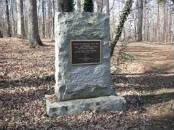
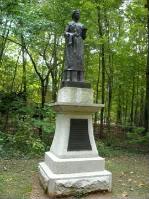
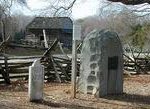
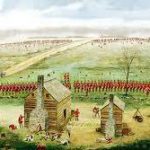
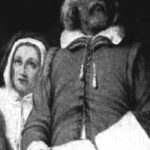
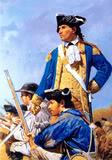
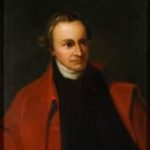
My 4x great grandmother Mary Kerr Dugan was a neighbor and good friend of Martha Bell. Together they ride on horseback to ask for clemency for Mary’s son, Thomas Dugan, when he was sentenced to be hanged by the Tories. He was pardoned.